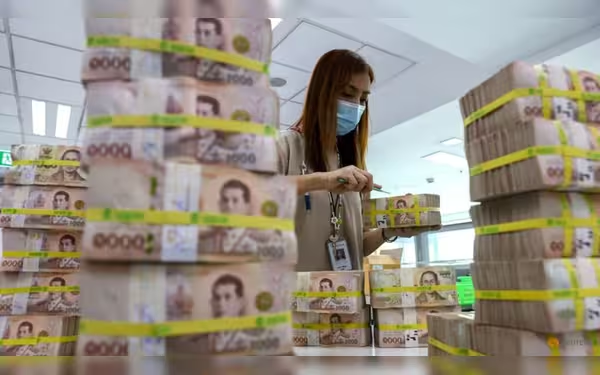Saturday, November 16, 2024 09:51 PM
Thai Baht Strength Impacts Exports, Minister Urges Action
- Thai baht's strength threatens export growth.
- Minister calls for interest rate cuts.
- Government plans fiscal stimulus amid economic concerns.
 Image Credits: channelnewsasia
Image Credits: channelnewsasiaThailand's commerce minister warns that the strong baht is harming exports, urging the central bank to consider interest rate cuts.
The strength of Thailand's baht has become a significant concern for the country's economy, particularly its export sector. Recently, the commerce minister, Pichai Naripthaphan, expressed that the baht is 'too strong' and is negatively impacting exports. This situation is particularly troubling as exports are only expected to see minimal growth this year. The minister has urged the Bank of Thailand (BOT) to take action regarding the currency's strength and suggested that cutting interest rates could help increase liquidity in the market.
As of Monday, the baht was trading at its strongest level against the U.S. dollar in over 18 months. This strength poses challenges for Thai exporters, who are already facing a tough market. The ministry has maintained its export growth target for the year at a modest 1 to 2 percent. In the first seven months of the year, exports saw a 3.8 percent increase compared to the same period in 2023, but the outlook remains cautious.
In August, the central bank decided to keep key interest rates steady at 2.50 percent for the fifth consecutive meeting. The BOT stated that the current policy settings are at neutral levels, resisting the government's calls for a rate cut. Prime Minister Paetongtarn Shinawatra, prior to her premiership, had indicated that the independence of the central bank could hinder the resolution of economic issues.
The government, led by the Pheu Thai party, has been vocal about its desire for a rate cut to support its planned fiscal stimulus measures aimed at revitalizing Southeast Asia's second-largest economy. A significant part of this plan includes the launch of a 'digital wallet' program, which will distribute 145 billion baht (approximately $4.4 billion) to vulnerable groups later this month. The broader stimulus package, totaling 450 billion baht, aims to provide 10,000 baht to 50 million Thais to encourage spending within local communities.
However, this initiative has faced criticism from economists, including former central bank governors, who label it as fiscally irresponsible. Despite these concerns, the government remains steadfast in its belief that such measures are essential to energize the economy. The central bank has projected a growth rate of just 2.6 percent for this year, a slight increase from 1.9 percent in 2023, but still lagging behind many regional counterparts.
The ongoing debate between the Thai government and the central bank over interest rates and currency strength highlights the complexities of managing an economy in a globalized world. As Thailand navigates these challenges, the balance between stimulating growth and maintaining fiscal responsibility will be crucial. The coming months will be pivotal in determining whether the government's strategies will yield the desired economic revival or if they will lead to further complications.













